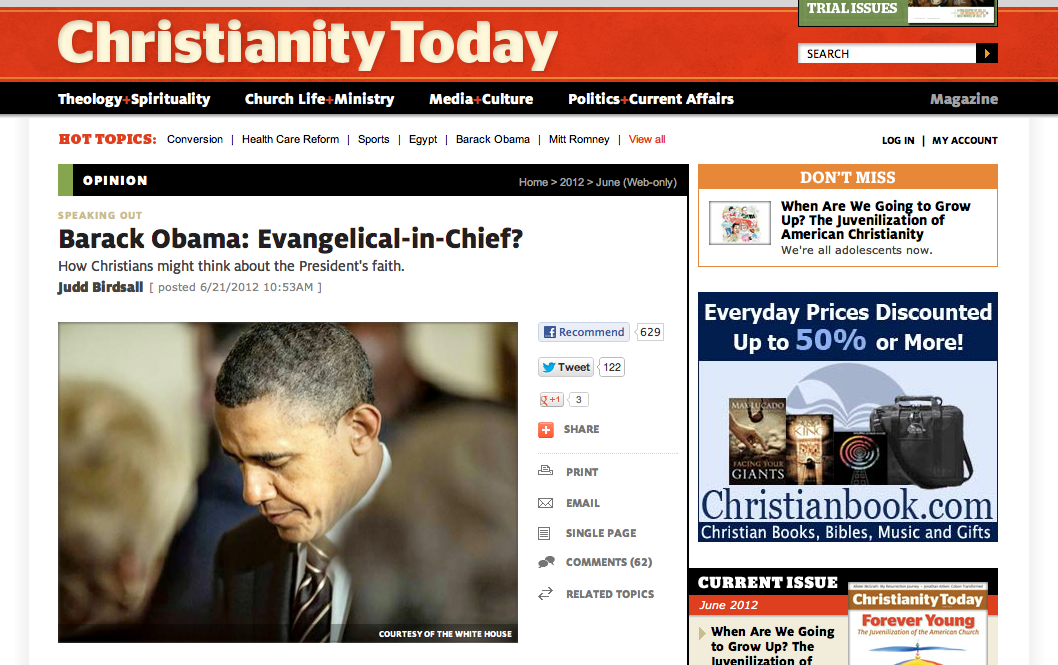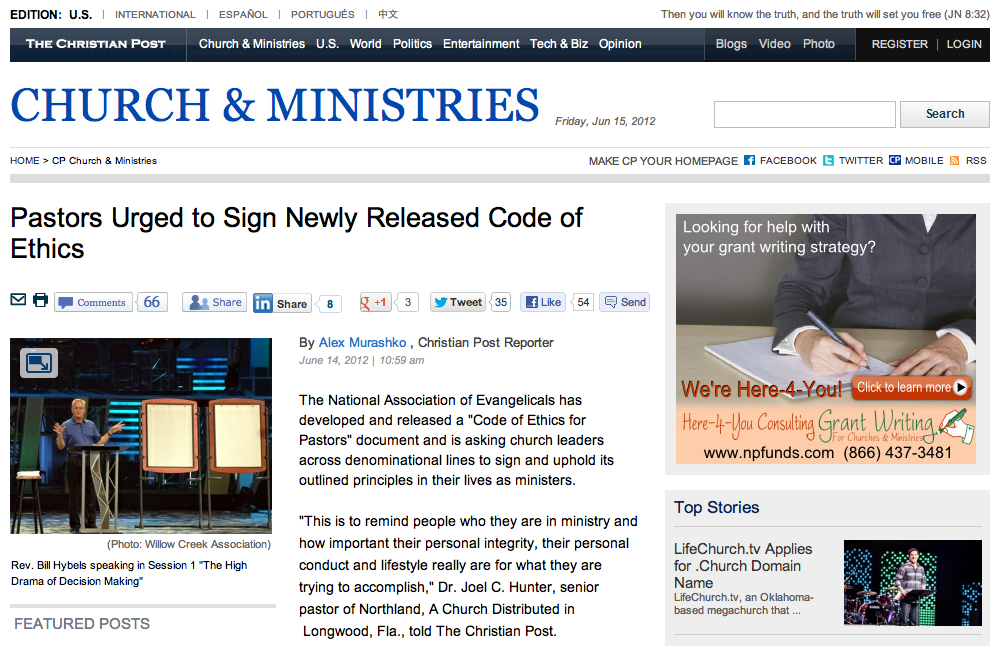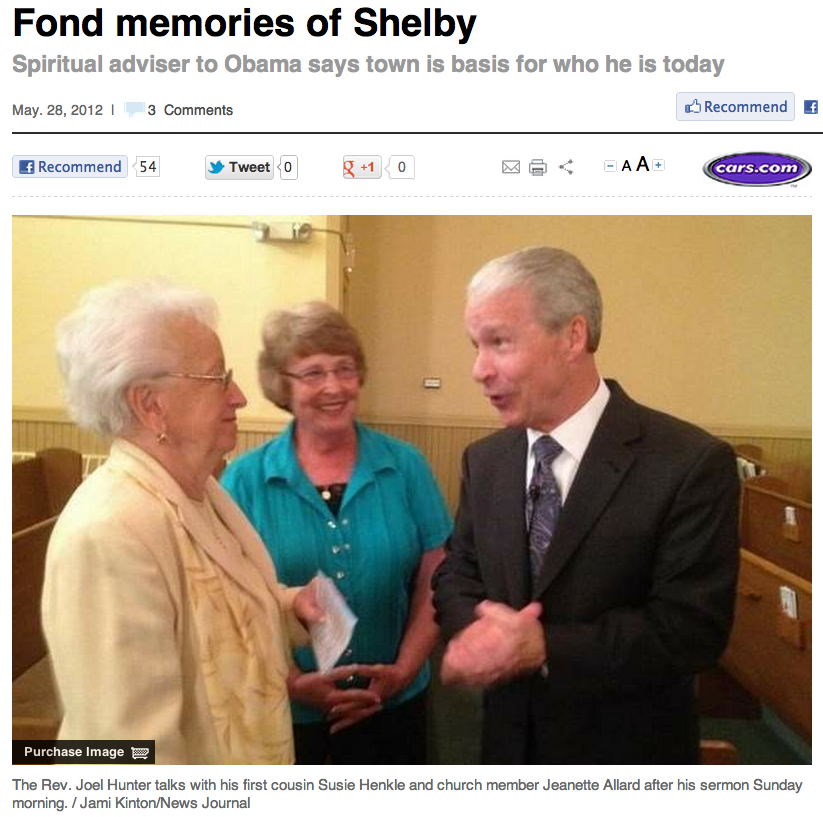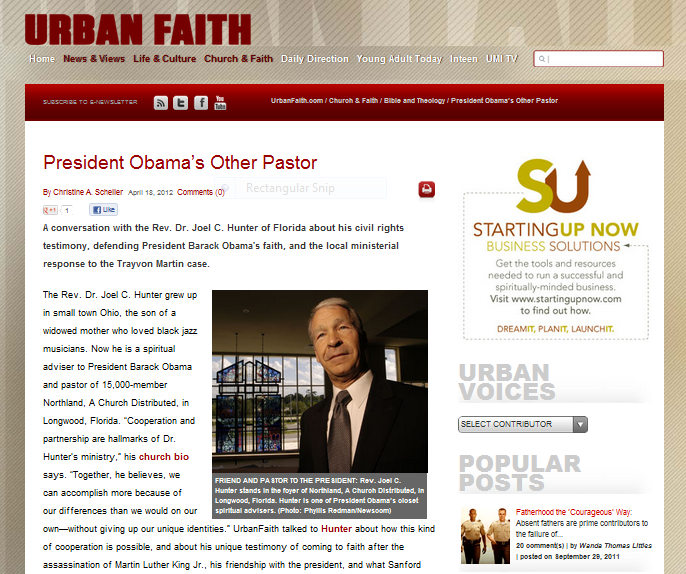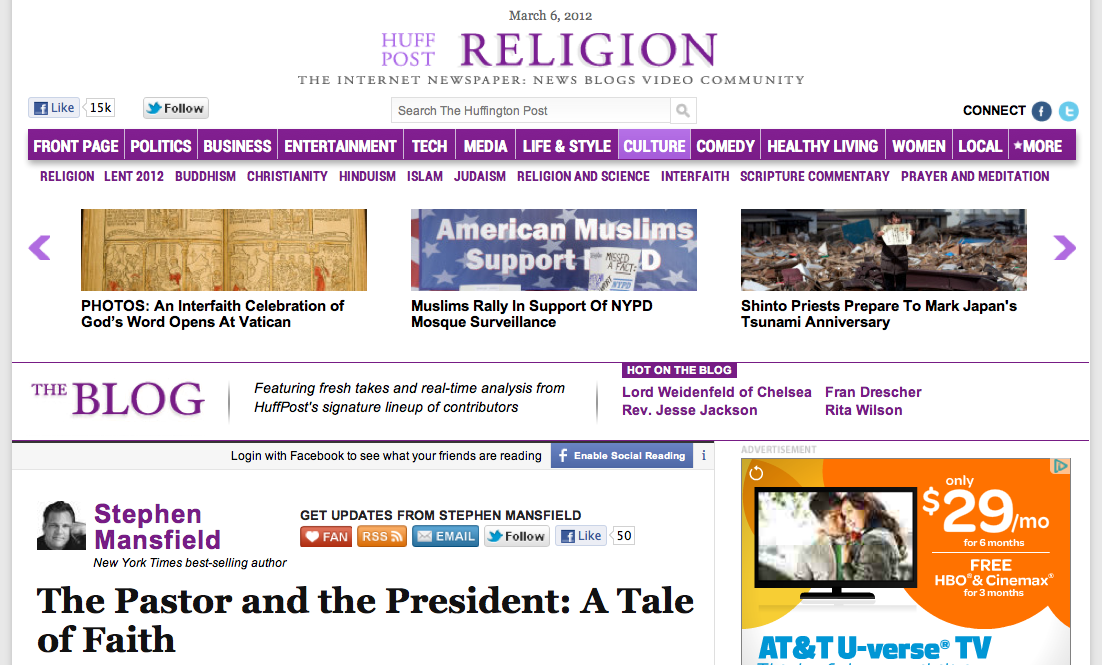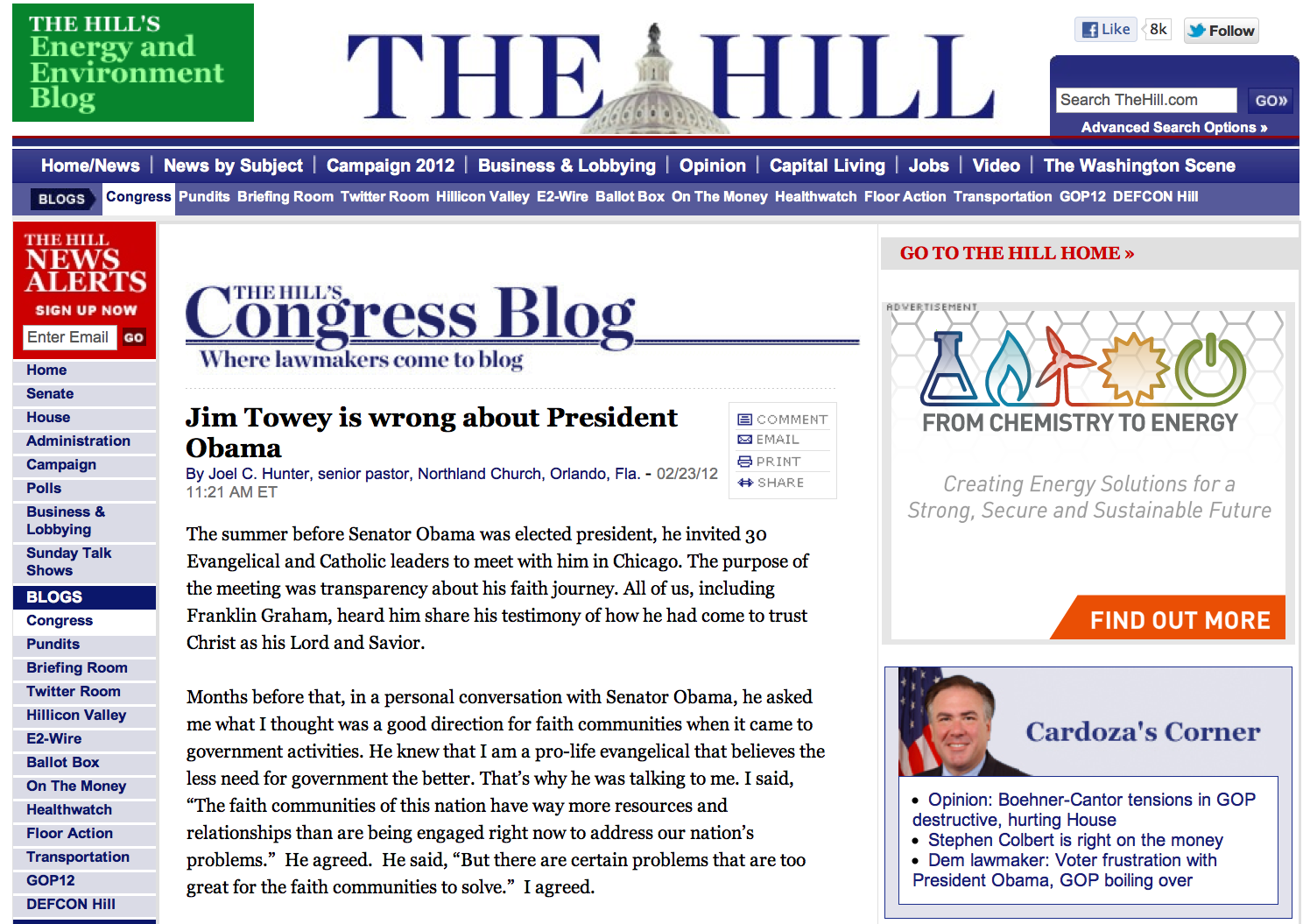How Christians Might Think About the President's Faith
The 2012 campaign has placed evangelicals in a paradox. A recent PRRI/RNS poll reveals that white evangelicals support a Mormon presidential candidate over Obama by an overwhelming 49% margin, but are simultaneously the religious group most likely to say it is important for a presidential candidate to share their religious beliefs (67%).
While there are plenty of legitimate policy reasons that evangelicals might support Governor Romney, their willingness to overlook their desire for a coreligionist candidate may also have at least something to do with the fact that 24% of them—higher than any other religious group—believe Obama is a Muslim, and even more are unaware (or unconvinced?) he's a Protestant. What if more evangelicals knew Obama largely shares their religious beliefs?
That the true religious identity of the world's most famous, most powerful man could remain a mystery to so many is itself a mystery. Before and especially during his presidency, Obama has been extraordinarily open on matters of faith, providing ample evidence for his repeated claim to be a devout Christian. The evidence may even suggest Obama is our evangelical-in-chief.
In his excellent religious biography of the President, The Faith of Barack Obama, author Stephen Mansfield spends several pages exploring whether Obama has been "born again." Mansfield's interviews with the President's spiritual advisors suggest so.
"I know he's born again," said Joshua DuBois, head of the White House Office of Faith-based and Neighborhood Partnerships, in an interview with Mansfield. A pastor's kid who served briefly in a Pentecostal pastorate himself, DuBois has queried the President about his faith and found that he "believes what the majority of Christians believe."
Joel Hunter, pastor of Florida's 15,000-member Northland Church and Obama's closest spiritual mentor, is even more emphatic. "There is simply no question about it: Barack Obama is a born again man who has trusted in Jesus Christ with his whole heart."
These assertions of Obama's "born again" status are instructive but only tell us so much. The Christian experience of spiritual rebirth is internal, subjective, and thus difficult to disprove. Moreover, it constitutes only one dimension of what it means to be an evangelical.
Admittedly, the meaning of evangelicalism is contested, and in the United States the term has become loaded with political baggage. Evangelicalism is an exceedingly diverse and diffuse global movement, lacking a unifying political agenda, institutional structure, or doctrinal basis (that's why the e in "evangelical" is usually not capitalized). Yet we can identify core features shared by evangelicals across all continents.
The most widely accepted definition of evangelicalism comes from British historian David Bebbington. According to Bebbington, an evangelical is a Christian marked by four distinct emphases: "conversionism, the belief that lives need to be changed; activism, the expression of the gospel in effort; biblicism, a particular regard for the Bible; and what may be termed crucicentrism, a stress on the sacrifice of Christ on the cross."
If Obama is an evangelical, we should expect to find him in alignment with at least this minimalist "Bebbington Quadrilateral." Let's look at how he squares with each of the four elements.
Conversionism: Barack Obama has a conversion story, if not an entirely traditional one. In his bestseller, The Audacity of Hope, Obama recounts how he warmed to Christianity, and the black church tradition in particular, while attending Trinity United Church of Christ in Chicago. One Sunday, Obama writes, "I felt God's spirit beckoning me. I submitted myself to His will, and dedicated myself to discovering His truth." Obama's eventual decision to be baptized "came about as a choice and not an epiphany; the questions I had did not magically disappear."
Only years later would Obama attach salvific significance to his embrace of the gospel. "I believe that faith gives me a path to be cleansed of sin and have eternal life," he told Christianity Today in 2008. His more recent statements sound even more evangelical. At the 2011 National Prayer Breakfast Obama spoke of Jesus, in typical evangelical idiom, as "my Lord and Savior." Still, the President acknowledges that his "faith journey has had its twists and turns"—a testimony that comports with a younger generation of evangelicals who are more likely to conceive of conversion as a process rather than a specific point in time.
Activism: For evangelicals, the experience of conversion naturally spills over into action, both evangelism and social witness. The President has addressed Christian activism on many occasions, and his latest National Prayer Breakfast speech was an extended meditation on how Christian faith compels charity and the pursuit of justice. "The Bible," Obama said, "teaches us to 'be doers of the word and not merely hearers.'We're required to have a living, breathing, active faith in our own lives.And each of us is called on to give something of ourselves for the betterment of others—and to live the truth of our faith not just with words, but with deeds."
Biblicism: Obama begins each day with a brief Scripture reading, and quotes frequently from the Bible. He clearly has a "special regard" for the Bible, though it's unclear if he holds to biblical inerrancy or infallibility. In 2007 Obama told the Chicago Sun-Times, "There are passages of the Bible that make perfect sense to me and others that I go, 'Ya know, I'm not sure about that.'" That was five years ago. More recently, he sounds surer about the Bible. Whereas his first Prayer Breakfast speech in 2009 had just one biblical reference—the Golden Rule, the politically safest biblical citation possible—his 2012 address offered several biblical quotations and allusions, indicating a growing respect for and reliance on the sacred text.
Crucicentrism: Obama has shared his reflections on the cross of Christ at his annual Easter Prayer Breakfast—a new White House tradition he started in 2010. At the 2012 event in April, the President described Holy Week as an opportunity to remember "all that Christ endured," to "give thanks for the all-important gift of grace," and to "celebrate that glorious overcoming, the sacrifice of a risen savior who died so that we might live." That's a summary of Easter all evangelicals can embrace.
We are accustomed to hearing politicians offering guarded generalities about the goodness of faith. It's quite another thing for the President of the United States to personally affirm the atoning death and resurrection of Jesus Christ. If Obama is a secret Muslim, he's really good at making his closet Islamic beliefs sound a lot like crucicentric Christianity.
So, is Obama our evangelical-in-chief? When a reporter asked Obama point blank in 2007 if he was an evangelical, the Illinois senator gave a nuanced, noncommittal answer:
Gosh, I'm not sure if labels are helpful here because the definition of an evangelical is so loose and subject to so many different interpretations. I came to Christianity through the black church tradition where the line between evangelical and non-evangelical is completely blurred. Nobody knows exactly what it means. Does it mean that you feel you've got a personal relationship with Christ the savior? Then that's directly part of the black church experience.
Five years later, his answer would likely be more definitive. As President, Obama has surrounded himself with evangelical spiritual advisors and has regularly interacted with the evangelical community. His public statements and private devotions point to a deepening faith—a path commonly tread by American heads of state. Obama's "experience of the presidency," says DuBois, "is strengthening his Christian muscles, making him a calm, confident, certain believer in Jesus Christ."
Hunter explained to Mansfield that Obama's theologically equivocal statements about sin, heaven, and other topics before entering the White House were those of a man with little biblical training. "He would not hold most of those views now," says Hunter. "He is very much in transition."
Hunter's point is crucial. Critics can piece together dated quotes from the President to paint a picture of a hesitant, heterodox Christian. That is unfair as it fails to account for Obama's progression from the highly unconventional, liberationist Christianity of Jeremiah Wright to the more mainstream evangelicalism of Hunter and DuBois.
But what about the President's policies? Hasn't his "evolution" on gay marriage, for example, gone in the opposite direction of his "transition" on faith matters? Obama may have become more conservative theologically, but he is still liberal politically—placing him somewhere on the Christian Left.
Obama's liberal positions don't sit well with most American evangelicals, and for some his views prove the insincerity of his religious claims. But relating Christian faith to public life is enormously complicated, and every believer must continually examine how he applies changeless truths in a changing world. We are all in "transition" to some degree. Obama deserves grace as he continues to work out what his maturing faith means for his policies.
Evangelicals may evaluate Obama's policy record and find ample grounds to give their vote to Mitt Romney. But in evaluating Obama's personal faith no credence should be given to groundless insinuations and graceless mischaracterizations.
Obama is clearly not a secret Muslim or anything other than what he claims to be: a committed Christian. For evangelicals, the commander-in-chief is a brother in Christ.
Judd Birdsall is a graduate of Wheaton College and a Ph.D. candidate at Cambridge University. From 2007 to 2011 he served at the U.S. State Department's Office of International Religious Freedom and was founding chairman of the Forum on Religion & Global Affairs.
FIND THIS ARTICLE AT: http://www.christianitytoday.com/ct/2012/juneweb-only/barack-obama-evangelical-in-chief.html
